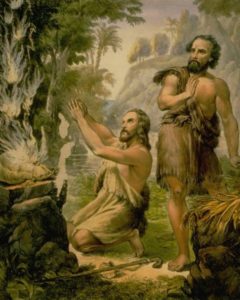“All the firstborn males in your herd of cattle and in your flock you are to set aside for Adonai your God; you are not to do any work with a firstborn from your herd or shear a firstborn sheep.”-Deuteronomy 15:19
From verse 19 of Deuteronomy 15, the discussion suddenly changes to that of the required sacrifice of the firstborn cattle.
This is a non-negotiable God principle we have already dealt with in quite extensive detail.
The principle is that the Lord demands that all firstlings belong to Him.
And these firstlings are NOT just restricted to one’s livestock or farm animals.
They are also to include the field crops and the sons born to a man.
Let’s have a super quick review here.
Why are the firstlings to be offered to the Lord?
The answer is because in doing so we are acknowledging that God is the SOURCE AND OWNER of all life and all that sustains life.
Recall the story of Cain and Abel.
Why did the Lord reject Cain’s offering but accept Abel’s?
It has nothing to do with one offering being a “blood” sacrifice and another being a grain offering as the Christians mistakenly assume.
The answer can be found in one key verse in this story.
“In the course of time Cain brought some of the fruits of the soil as an offering to the Lord. And Abel also brought an offering—fat portions from some of the firstborn of his flock. The Lord looked with favor on Abel and his offering, but on Cain and his offering he did not look with favor. So Cain was very angry, and his face was downcast.”-Genesis 4:3-5
Notice that the offering that Cain brought was “in the course of time” meaning that it was NOT a first fruits offering and thus the Lord rejected it.
However, the Scripture clearly tells us that Abel’s offering came from “the firstborn of his flock” and thus was accepted by God.
Another interesting thing I could point out is that I think one could argue from these passages that the Lord expects mankind to have a good working knowledge of Torah principles because obviously Cain and Abel existed way before there was a race of people known as the Hebrews.
Anyways, I digress.
Let’s move on.
We are told that once per year the firstlings are to be brought to the central sanctuary which was the Tabernacle and then later the Temple.
Only after the worshipper has offered up his sacrifices to the priests can he eat the meat from it.
In other words, a worshipper was NOT allowed to make up some bogus claim that he had already “sacrificed” his animal in his hometown and that is why he was now eating it.
Nope, sacrifice was ONLY permitted at the place the Lord chose…
…which again was the central sanctuary.
A worshipper had three chances to sacrifice before the Lord.
Do you know what three chances I’m talking about?
Of course I’m talking about the three God-ordained pilgrimage festivals (HAG in Hebrew).
Now one of the non-negotiable attributes of the sacrifices offered up is that they had to be minus any physical defects or blemishes.
This doesn’t mean the sacrifices had to be paragons of perfection.
But they had to be the best of the bunch.
Giving the best and most valuable animal from the bunch really showed where one’s heart was at in regards to his relationship with the Lord.
It showed that he really did place God above everything else in his life which is unfortunately something that Cain did not do.
A quick side note before closing.
A while back in our studies we recently learned that the Lord had given Israel permission to slaughter animals whenever they wanted to eat meat for food.
In such a case, if they had a firstling that was blemished or had a physical defect, it was okay to use that animal for food even though it was forbidden for sacrifice.




Perfect explanation.
Thanks for the positive thumbs up Maria! Be blessed and shalom.